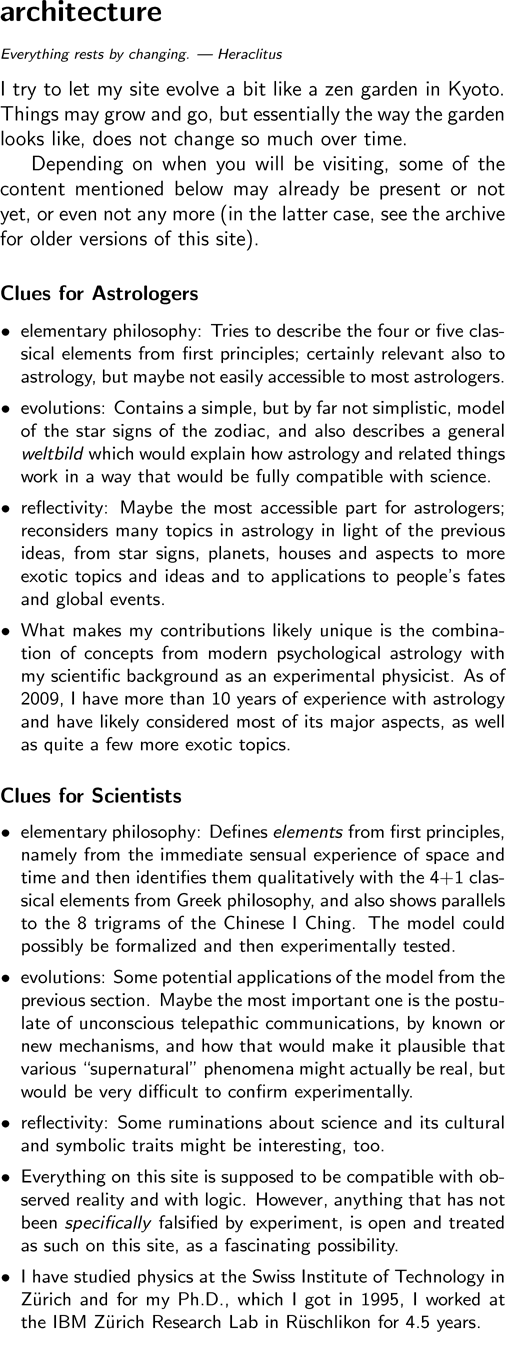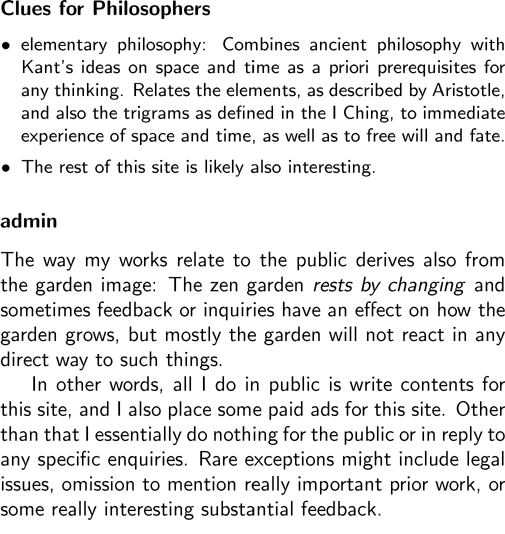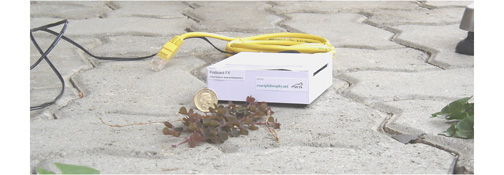|
architecture
Everything rests by changing. - Heraclitus
I try to let my site evolve a bit like a zen garden in Kyoto.
Things may grow and go, but essentially the way the garden
looks like, does not change so much over time.
Depending on when you will be visiting, some of the content
mentioned below may already be present or not yet, or even
not any more (in the latter case, see the archive for older
versions of this site).
Clues for Astrologers
- elementary philosophy: Tries to describe the four or five
classical elements from first principles; certainly relevant also
to astrology, but maybe not easily accessible to most astrologers.
- evolutions: Contains a simple, but by far not simplistic,
model of the star signs of the zodiac, and also describes a general
weltbild which would explain how astrology and related
things work in a way that would be fully compatible with science.
- reflectivity: Maybe the most accessible part for astrologers;
reconsiders many topics in astrology in light of the previous ideas,
from star signs, planets, houses and aspects to more exotic topics
and ideas and to applications to people's fates and global events.
- What makes my contributions likely unique is the combination
of concepts from modern psychological astrology with my scientific
background as an experimental physicist. As of 2009, I have more
than 10 years of experience with astrology and have likely considered
most of its major aspects, as well as quite a few more exotic topics.
Clues for Scientists
- elementary philosophy: Defines elements from first
principles, namely from the immediate sensual experience of space
and time and then identifies them qualitatively with the 4+1
classical elements from Greek philosophy, and also shows parallels
to the 8 trigrams of the Chinese I Ching. The model could possibly
be formalized and then experimentally tested.
- evolutions: Some potential applications of the model from the
previous section. Maybe the most important one is the postulate of
unconscious telepathic communications, by known or new mechanisms,
and how that would make it plausible that various "supernatural"
phenomena might actually be real, but would be very difficult to
confirm experimentally.
- reflectivity: Some ruminations about science and its cultural
and symbolic traits might be interesting, too.
\item Everything on this site is supposed to be compatible with
observed reality and with logic. However, anything that has not
been specifically falsified by experiment, is open and
treated as such on this site, as a fascinating possibility.
- I have studied physics at the Swiss Institute of Technology
in Zürich and for my Ph.D., which I got in 1995, I worked
at the IBM Zürich Research Lab in Rüschlikon for 4.5 years.
Clues for Philosophers
- elementary philosophy: Combines ancient philosophy with
Kant's ideas on space and time as a priori prerequisites for
any thinking. Relates the elements, as described by Aristotle,
and also the trigrams as defined in the I Ching, to immediate
experience of space and time, as well as to free will and fate.
- The rest of this site is likely also interesting.
admin
The way my works relate to the public derives also from
the garden image: The zen garden rests by changing
and sometimes feedback or inquiries have an effect on how
the garden grows, but mostly the garden will not react in
any direct way to such things.
In other words, all I do in public is write contents for this
site, and I also place some paid ads for this site. Other
than that I essentially do nothing for the public or in reply
to any specific enquiries. Rare exceptions might include legal
issues, omission to mention really important prior work, or
some really interesting substantial feedback.
The web server is a very small embedded Linux machine, called
Foxboard from Acme Systems (no joke!), located in my place in
my home town Adliswil, near Zürich in Switzerland, where I
also wrote all contents of this site.
Copyright © 2002 - now by Alain Stalder. All Rights Reserved.
Made in Switzerland.
|
















